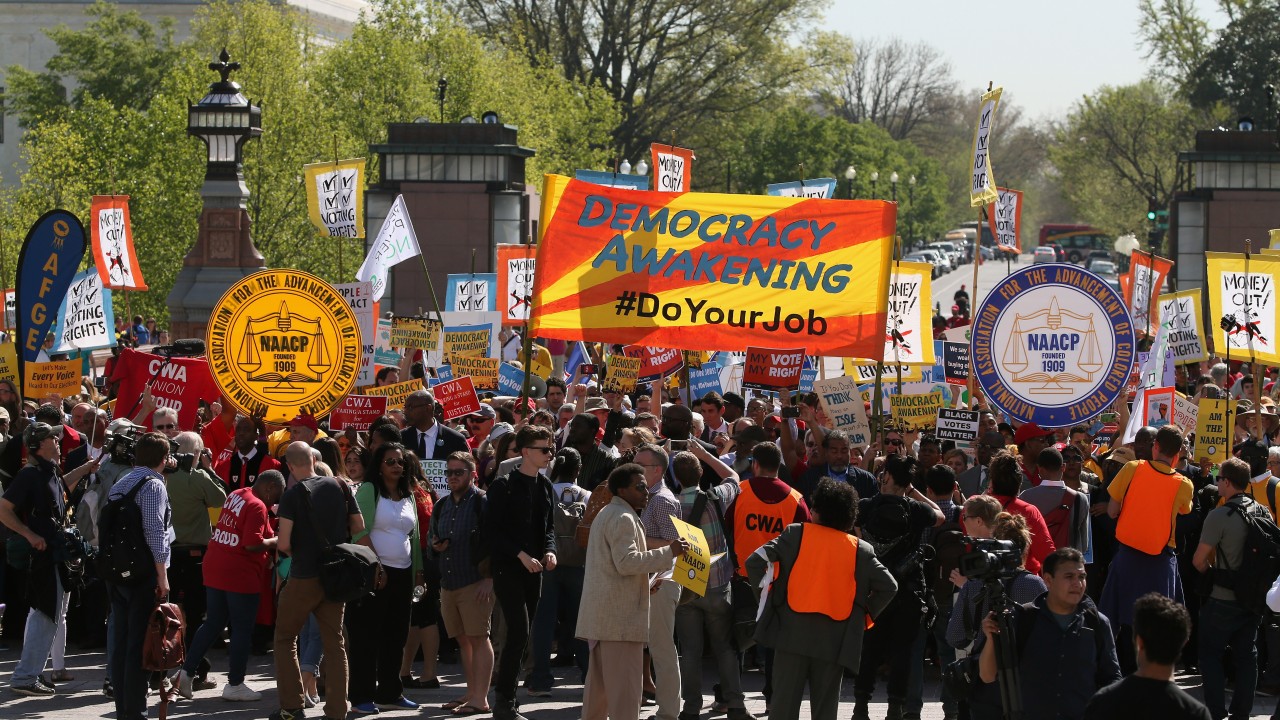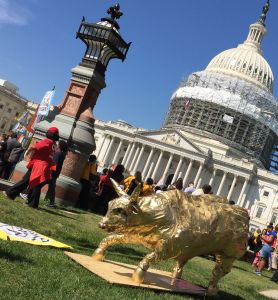
A broad coalition of organizations joined a march for voting rights and campaign finance reform at the U.S. Capitol, where more than 1,200 were arrested during the course of a week of civil disobedience. (Photo: Mark Wilson/Getty Images)
Under the breathtaking gold gilt ceiling and crystal chandeliers of the US Senate Russell Caucus Room, scene of the Army-McCarthy hearings and the Senate’s explosive inquiry into Watergate, a motley group of would-be lobbyists huddled on Monday morning, hoping to make some history of their own. They did not look like your standard denizens of Washington’s Gucci Gulch. Most wore walking shoes and the casual attire appropriate for a protest march. Some carried backpacks. One clutched a sleeping bag.
As they made their way through the corridors of the US Capitol complex, they peeked out windows to admire the courtyards below. They marveled at the size of the cafeteria where they lunched. But when they got into their representatives’ inner sanctum, they were not cowed. “How many corporate lobbyists have been in here?” one asked his congressman’s chief of staff. “I’m here because America shouldn’t be an oligarchy,” said another.
The scene vividly summed up the promise and the challenges facing the self-styled democracy movement that brought together hundreds of disparate organizations to demand expanded voting rights, campaign finance reform and a new Supreme Court justice. After two weeks of marching and more than 1,200 arrests, the activists appeared to be in broad agreement: Their work is just beginning.
“We’re in the process of building what I think is the largest movement for democratic reform in decades,” said Fred Wertheimer, president of Democracy 21. But Wertheimer, whose work on campaign finance reform dates back to Watergate, cautioned patience. “This is not a fight that is going to be won tomorrow,” he said. “These fights often take a good bit of time.”
As police were arresting the last of the protesters to stage a sit-in on the Capitol steps — a group that included Cornell William Brooks, president of the NAACP, and Chris Shelton, president of the Communications Workers of America — other marchers took on the inside job, visiting the offices of their elected representatives. They found few lawmakers to buttonhole. Marge Baker of People for the American Way, one of the Washington-based activists shepherding the demonstrators, said it didn’t matter: “The people you need to get to as a lobbyist are the staff,” she said.
But she encouraged the grassroots lobbyists-for-a-day to follow up. “The way you get to your senator or representative is at home,” Baker said. Or, as former Texas Agriculture Secretary Jim Hightower put it more colorfully in an interview the day before, constituents need “to grab ’em by the short hairs right where they live.”
That’s where Hightower and other longtime activists are advising those who came to Washington this week to aim their energy.”I don’t go to the Hill anymore,” said Patrick Carolan of the Franciscan Action Network. “It’s a waste of time.”

The Franciscan Action Network showed it’s view of congressional priorities by bringing a golden calf to the Capitol. (Photo:Kathy Kiely)
The exasperation is understandable. Polls routinely show that super-majorities of Americans, regardless of party affiliation, share the marchers’ disgust with a political system dominated by money. Even so, the protests on Congress’ doorstep moved nothing on the inside.
The Senate spent last week working on a bill to extend business tax breaks, while also approving resolutions honoring assistant principals, various collegiate championship teams, Arbor Day and National Take Our Sons and Daughters to Work Day. The House, meanwhile, approved a bill that was widely seen as a gift to Internet service providers and another intended to reduce the independence of the government’s Financial Stability Oversight Council, formed to reduce risky lending practices.
Rep. John Sarbanes, a Maryland Democrat, has sponsored one of the bills on the marchers’ agenda — a measure that would set up a series of financial incentives for small campaign givers and match their donations with public funds. He’s gathering signatures on letters to the chairmen of two committees where the legislation has been languishing, asking that they “at least have a hearing,” At a Saturday event where more than 500 people gathered for workshops and strategy sessions, he advised supporters of public-financed campaigns to focus their efforts on enacting legislation back home. “This change is going to come because of what people are doing on the state level,” he said. He plugged a bill that the Washington, DC, city council is considering for local public campaign financing. “If we can get a win right here where Congress sits, we’re going to be able to bring it to the attention of my colleagues,” he said.
The inertia on Capitol Hill comes despite considerable long-term pressure: it has spawned a cottage industry of good-government groups that track and oppose the proliferation of campaign dollars. Delvone Michael, a leader of Working Families DC, called it “the non-profit industrial complex” and said the outreach those groups have made to legacy civil rights organizations and community organizers is important though not quite enough. “I’m disappointed that there aren’t more people in the room who look like me,” Michael, an African American, said at one of the Saturday workshops where he spoke.
Nick Penniman of Issue One, one of the newer groups in the campaign finance reform bloc, says the movement has to expand ideologically as well. “It’s essential for the future of the cause to knock it out of the lefty zone and into the center zone,” he said. “It’s not a lefty cause. It’s an all-American cause.”
Dan Alden of Lexington, Massachusetts, made that point to one lawmaker’s legislative director on his lobbying rounds. “A lot of tea party people want to get money out of politics,” he said, urging that his state’s liberal Democrats “reach across the aisle” for allies. “I think if we could get money out of politics, a lot of other things would fall into place.”
One lawmaker who has tried to follow Alden’s advice says he’s been stiff-armed. Rep. David Price, a North Carolina Democrat sponsoring legislation to revive public financing for presidential campaigns, says that when he tries to talk to Republicans about the issue “what I get is pretty much a refusal to even think about it.”
— Kai Newkirk
The marchers’ frustration extends beyond Republicans.
“President Obama has been, unfortunately, just a tremendous disappointment on this question,” said Kai Newkirk, of 99Rise, one of the leaders of the Democracy Spring march from Philadelphia to Washington. Campaign finance activists on the left and on the right are urging Obama to sign an executive order forcing federal contractors to disclose campaign donations — including those that are currently secret because they go to political non-profits that don’t have to disclose donors. “Unless he takes executive action and begins to use the bully pulpit on this issue,” Newkirk said, “he will go down as someone who deepened this crisis of corruption, which is a terrible disappointment given the expectations and hopes he raised for change in Washington as a candidate in 2008.”
Democracy 21’s Wertheimer said activists need to press candidates not only to talk reform, but to provide specific details about how they intend to achieve it. “We had commitments from [Bill] Clinton and Obama that they would make this a priority issue and once they were elected, it did not happen,” he said.
Pressuring candidates means mobilizing voters, but some of the people who most need their voices to be heard have been disillusioned into political paralysis. “People have divested from the system because they don’t think it takes care of them,” said Trina Jackson of Boston. A number of the marchers talked about the uphill battles they are facing to get their own communities engaged. Over lunch at the Senate cafeteria, students from the University of Massachusetts commiserated about how hard it is to convince roommates to register to vote.
— Frances Moore Lappé
In some communities, rallying citizens around issues of ballot access and campaign finance “is very tough because they have so many pressing issues, they don’t see the relevance,” said Ezra Tillman, a pastor whose Flint, Michigan, churchgoers have been contending with lead-contaminated water.
Still, among those who participated in the march, there was a clear sense of energy and deep commitment. “I’ve been arrested for a lot of causes,” said the Franciscan Action Network’s Carolan shortly after being released from Capitol Hill police custody on Monday. “But this is the first time there’s been such a wide group.” He’s hopeful that the many organizations that have supported the week’s protests are ready to “get out of their silos” for a larger cause.
Anti-hunger activist Frances Moore Lappé, author of Diet for a Small Planet and founder of the Small Planet Institute, said she has written her last book about world hunger and now intends to devote her energies to what she calls “the mother issue.”
“We can’t solve hunger or climate change or any other issues in this world if we don’t have real democracy,” she said.
Andy Argo of Kalamazoo, Michigan believes that the “pervasive sense of cynicism and willful disengagement” that has kept young voters away from the polls, especially in non-presidential election years, is about to end. “There’s a very big sea change coming in the way people my age engage in elections,” the 29-year-old health care worker said as he shouldered his backpack before heading off to visit his congressman and senators. “We’re just trying to warn our representatives that there’s something in the wind and they should pay attention to it.”




